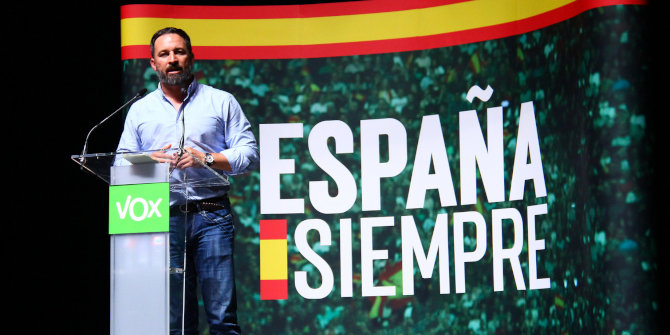
 Last week’s visit by German Chancellor Angela Merkel to Greece was marked by protests strongly rejecting Germany and the EU’s perceived role in Greece’s economic crisis. At the same time, support for the neo-Nazi Golden Dawn is on the rise in Greece, with the party now holding 18 out of 300 seats in the national parliament. Daphne Halikiopoulou and Sofia Vasilopoulou look at the contradictions between Greece’s rejection of the EU and Germany as the “fourth reich” and the support for a party with a neo-Nazi ideology.
Last week’s visit by German Chancellor Angela Merkel to Greece was marked by protests strongly rejecting Germany and the EU’s perceived role in Greece’s economic crisis. At the same time, support for the neo-Nazi Golden Dawn is on the rise in Greece, with the party now holding 18 out of 300 seats in the national parliament. Daphne Halikiopoulou and Sofia Vasilopoulou look at the contradictions between Greece’s rejection of the EU and Germany as the “fourth reich” and the support for a party with a neo-Nazi ideology.
As austerity measures continue, Greece plunges further into extremism. Angela Merkel’s visit to Athens early last week was met with strong reactions by protesters – reactions that tended to be underpinned by a nationalist rhetoric, alluding to a language of liberation, restoration of national sovereignty, a strong rejection of external involvement, resistance to foreign domination and struggle against external impositions. Protesters dressed in Nazi uniforms marching outside the Greek Parliament held banners inscribing ‘No to the Fourth Reich’ while shouting ‘loanshark’ and ‘Nazi’ at the German Chancellor.
But here lies the contradiction of Greek nationalism: while on the one hand it seems to be directed against those foreign powers that many Greeks hold responsible for the continuation of the crisis, alluding similarities between the current German involvement in Greek economic affairs with the Nazi invasion of the 1940s; on the other, at the same time over 400,000 Greek citizens have recently voted a domestic neo-Nazi party into Parliament with 18 seats out of 300. Recent polls estimate Golden Dawn support at over ten per cent. How can a country protest against the imposition of a perceived ‘Fourth Reich’ but at the same time support a real Nazi threat from within?
The Golden Dawn is an extreme, ultra-nationalist and racist party. Among current far right-wing parties in Europe, it is the one that most resembles traditional Nazism in its outright espousal of National Socialism: the endorsement of what it terms the ‘third biggest ideology in history’, i.e. nationalism, combined with support for an all-powerful state premised on ‘popular sovereignty’. It seeks to impose its principles through violent means. It is expansionist and irredentist (supporting a larger Greek state composed of Greek-inhabited areas). The party emphasises white supremacy, understands the nation as a given, unchanging reality and defines the Greek nation as an entity bound together by biological and cultural characteristics such as blood, race, creed and language.
The party is indiscriminately anti-immigrant. Further to its electoral campaign in June, where many of its members declared that there is no such thing as legal immigration, their manifesto promise that they will expel all immigrants from Greece, and their denial to grant any non-Greek (as defined by the biological features described above) full political rights, in practice they have been organising numerous welfare provision activities such as blood donations and ‘soup kitchens’ for Greeks alone. The Golden Dawn has made it clear: to receive any of the above, a Greek identity card is required.
Against the backdrop of the economic crisis, the immigrant issue can be easily seen as complementary to the economic issue. If we understand immigration as a question of welfare, i.e. who should be entitled to the collective goods of the state, in a country where because of the severe crisis the collective goods of the state are now scarce, the ability of the Golden Dawn to play the immigration card as a question of welfare provision and the increasingly positive reception of its activities are both hardly surprising but at the same time highly alarming.
In the context of the crisis, the Golden Dawn’s anti-systemicness can also be seen as significant for its increasing support. The party centres its rhetoric against the old ‘rotten system’, which is upheld by politicians associated with stagnation and corruption. The party’s campaigns place a great emphasis on the Memorandum of Understanding (between Greece, the EU and the IMF which outlines how Greece will reform its economy in exchange for the bailout) and the austerity measures which it sees as the product of exploitative foreign powers and their domestic collaborators, i.e. those Greek politicians who have, and continue to, support it in order to profit financially. Being ‘real Greek’ and corrupt are mutually exclusive characteristics for the Golden Dawn. Those domestic traitors cannot share the traits that define Greekness: for example, they have characterised the former Prime Minister George Papandreou as only 25 per cent Greek and this apparently is partially responsible for his perceived involvement in the crisis. This allows the Golden Dawn to link its nationalist narrative, i.e. who may be understood as belonging to the Greek nation, with economic narratives, i.e. those responsible for the crisis are external powers and their domestic collaborators that do not share the Greek traits and seek to undermine Greece for personal profit.
Beyond the farcical elements that some of these statements contain, the actual implications are paramount. Greece is descending into violence and extremism. Following the Golden Dawn’s election in the Greek Parliament in June, the country has experienced the occurrence of large numbers of violent incidents, including beatings and stabbings against immigrants and minorities, clashes with anti-fascist demonstrators and left-wing groups. Examples abound: from physically assaulting another MP live on Greek television and attacking market vendors of non-Greek origin in the town of Rafina, to numerous attacks against minorities on public transport and the streets. A most recent example is the gathering of Golden Dawn members – and some religious groups – outside the Hytirio theatre in central Athens to protest against Terrence McNally’s play ‘Corpus Christi’ as part of their disapproval of the play’s moral agenda, which they characterised as blasphemous. The event was marked by violence – a Golden Dawn MP verbally abusing and physically attacking people while the police looked on only a few yards away.
Besides the violence issue, there are also significant policy implications as the Golden Dawn has managed to shift certain debates – and by extension the policy agenda – in Greece on a number of issues which in liberal democratic countries are non-negotiable, such as freedom of speech and human rights. Earlier this month, following a Golden Dawn motion in the Greek parliament, a 27 year old man was arrested and charged with blasphemy for publishing satirical comments about a Greek holy man, Geron Paisios, on Facebook. Also shocking was the recent decision of the Minister of Interior to request, following a prompting by Golden Dawn MPs, all municipalities in Greece to provide the government with detailed census information of all non-Greek children, echoing Nazi practices of the 1940s.
The ability of the Golden Dawn to push its agenda forward, and to often carry out acts of violence unchecked, raises the fundamental but sensitive issue regarding the relationship between the Golden Dawn and the police. For many in Greece this is common knowledge. According to an article published in the newspaper ‘To Vima’ in June 2012, significant numbers of policemen voted for the Golden Dawn in the May and June elections. Although official information is scarce and unconfirmed, the issue raises questions of critical importance. If, echoing Max Weber, we understand power as the ability to control organised violence within the state, then what may be the implications of a potential link between the Golden Dawn and the police for the future of Greece’s democracy?
The Golden Dawn phenomenon, and the rise of the far-right more generally in Greece, is better understood as a broader phenomenon of the rise of extremes – the decline of mainstream politics and support for extremism of both the right and the left. Perhaps in a country that recently experienced civil war and dictatorship and whose politics has been characterised by violence throughout the 20th century, this type of polarisation shouldn’t be surprising. It could be that the stability of the metapolitefsi (post-dictatorship) era was an aberration and not the norm in Greek politics. What Greece needs is educational reform and a strong civil society. But this is difficult: although civil society organizations are now emerging, shifting a people’s attitudes requires generational change. In the meantime violence and extremism can have significant internal implications – for the country’s democracy and stability – as well as external, for the EU, the Balkan region and Greece’s bilateral relations with Turkey.
Please read our comments policy before commenting.
Note: This article gives the views of the author, and not the position of EUROPP – European Politics and Policy, nor of the London School of Economics.
Shortened URL for this post: http://bit.ly/SW8JAg
_________________________________
About the authors
 Daphne Halikiopoulou – University of Reading
Daphne Halikiopoulou – University of Reading
Dr Halikiopoulou is Lecturer in Politics, specialising in comparative European and British politics at the Politics and International Relations department at the University of Reading. Her work examines contemporary issues related to the study of nationalism and radical politics in Europe, including political mobilisation and violence, religion, the politics and policies of exclusion (immigration and citizenship) and the policies of radical right and radical left wing parties. She is author of Patterns of Secularization: Church, State and Nation in Greece and the Republic of Ireland (Ashgate 2011) and co- editor of Nationalism and globalisation: conflicting or complementary (Routledge 2011 with Sofia Vasilopoulou). Recent articles have examined the role of nationalism in the politics and rhetoric of European radical right and radical left- wing parties. She is currently working on a comparative study of violent right-wing street movements across Europe.
 Sofia Vasilopoulou – University of York
Sofia Vasilopoulou – University of York
Sofia Vasilopoulou is a Lecturer at the University of York. She was previously a Fellow in Comparative Political Analysis in the School of Public Policy, University College London, and a Teaching Associate in Politics at Aston University, UK. She has taught extensively modules on Comparative Politics and Government, European Union politics, Political Parties, Political Economy and Quantitative methods. She is the Editor (with Daphne Halikiopoulou) of Nationalism and Globalisation: Conflicting or Complementary? (Routledge, 2011).





6 Comments